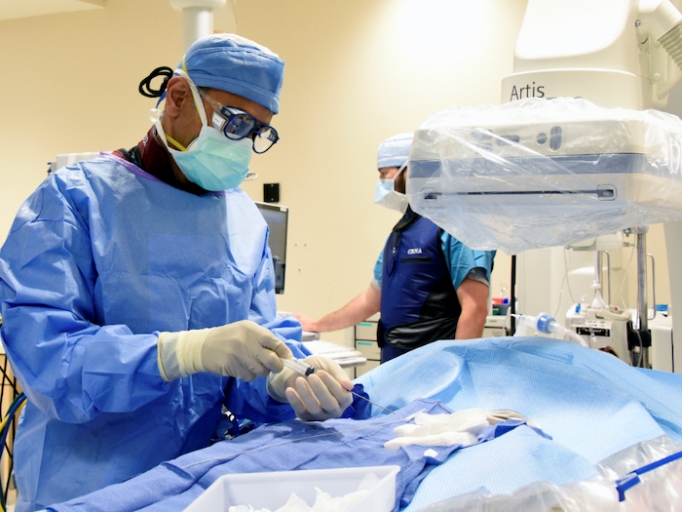Can We Stop the Anticoagulants (Blood Thinners)?

Dr. Prabal Guha, McLeod Electrophysiologist
What is Atrial Fibrillation?
Atrial fibrillation is a heart condition where the upper chamber of the heart beats irregularly. This can cause blood to pool and form clots in an area of the heart called the left atrial appendage. If a blood clot does form, it can travel through an artery to the brain and cause a stroke.
People with untreated atrial fibrillation may be at greater risk for stroke than people with normal heart rhythms. In atrial fibrillation, the left atrial appendage, a small pouch located on the top of the heart, is believed to be the source of a majority of stroke-causing blood clots.
Anyone can have a stroke no matter what age, race or gender. The chances of stroke increase with the following risk factors:
- Atrial Fibrillation
- Coronary Artery Disease
- Diabetes
- High Blood Pressure
- High Cholesterol
Stroke is the most common and perhaps the most feared complication of atrial fibrillation.
How can you reduce your risk of stroke?
Medications like anticoagulants also known as blood thinners can reduce the risk of blood clots that could lead to stroke. Warfarin is an example of a blood thinning medication that keeps the blood from sticking together and forming clots. There are several newer drugs like Dabigatran, Apixiban and Rivaroxaban, which help to reduce the risk of stroke in some groups of patients with atrial fibrillation.
Anticoagulants work well for many patients; however, there are reasons why some patients do not take blood thinners. While they prevent blood clots, anticoagulants can also increase the risk of bleeding problems. When a bleeding event occurs, like a cut taking longer than normal to stop bleeding, it is usually easily treated. But, in some cases, bleeding can be quite serious and require hospitalization.
WATCHMAN
Patients who have atrial fibrillation without significant heart valve disease, and who are on anticoagulant medications, may be a candidate for a device available at the McLeod Heart and Vascular Institute called the WATCHMAN Left Atrial Appendage Closure Device. The WATCHMAN, about the size of a quarter, is implanted at the opening of the left atrial appendage to prevent blood clots from entering the blood stream and potentially causing a stroke. The device is a one-time implant that does not need to be replaced.
By closing off the left atrial appendage, the source of more than 90 percent of stroke-causing blood clots, the risk of stroke may be reduced and over time patients may be weaned off their blood thinning medications.
To perform the WATCHMAN procedure, the implant is guided via a catheter inserted through a vein in the upper leg. Once the implant is in position in the left atrial appendage it is opened similar to the opening up of an umbrella. The implant remains permanently in the heart.
After the procedure, patients are monitored overnight in the hospital during their recovery, and discharged home the next day. After a few months, patients may be able to stop taking their blood thinning medications entirely.
WATCHMAN FLX
McLeod began offering the WATCHMAN device more than five years ago. Now the creators of WATCHMAN have developed the next generation, the WATCHMAN FLX.
The new device is available in more sizes, which enables the treatment of a wider variety of patients. To determine the correct size needed, a transesophageal echocardiography test (TEE) is performed. This is a test that uses ultrasound technology to create highly detailed pictures of the heart and its internal structures.
The WATCHMAN FLX features a new, fully-rounded design that allows the ability to maneuver within the left atrial appendage for correct positioning. Once in place, if necessary, it can be repositioned during the procedure making it more customizable to the individual patient’s anatomy.
Are you a Candidate?
The WATCHMAN is for patients with atrial fibrillation who need or take anticoagulant or blood thinning medications to reduce their risk of stroke, but their physician is recommending this device as an alternative to long-term use of these drugs because of bleeding risks or other concerns.
The WATCHMAN does not cure atrial fibrillation and after receiving the implant it is important that patients continue to see their cardiologist.
To find out if you are a candidate for the WATCHMAN device, please call McLeod Cardiology Associates at 843-667-1891.
Electrophysiologist Dr. Prabal Guha of McLeod Cardiology Associates can help you manage your atrial fibrillation. Dr. Guha cares for patients at their offices located in Florence and Sumter. Appointments can be made by calling 843-667-1891.
-
McLEOD REGIONAL MEDICAL CENTER FLORENCE
843-777-2000 -
McLEOD DARLINGTON
843-777-1100 -
McLEOD DILLON
843-774-4111 -
McLEOD LORIS
843-716-7000 -
McLEOD SEACOAST
843-390-8100 -
McLEOD CHERAW
843-537-7881 -
McLEOD CLARENDON
803-433-3000



-
McLEOD REGIONAL MEDICAL CENTER FLORENCE
843-777-2000 -
McLEOD DARLINGTON
843-777-1100 -
McLEOD DILLON
843-774-4111 -
McLEOD LORIS
843-716-7000 -
McLEOD SEACOAST
843-390-8100 -
McLEOD CHERAW
843-537-7881 -
McLEOD CLARENDON
803-433-3000
 Find a Doctor
Find a Doctor  Locations
Locations  Services
Services